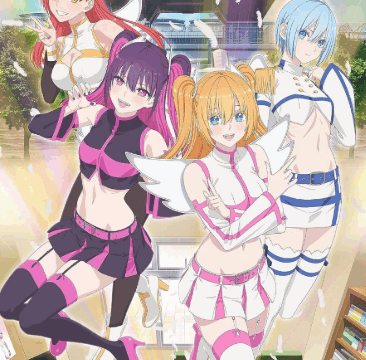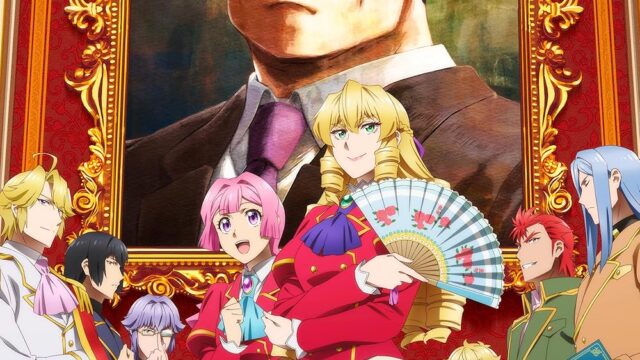Season Review: Magical Girl Friendship Squad Season One
Overview (Spoilers Below)
Alex and Daisy are just your average everyday millennials until they’re granted magical powers by Nut, an adorable red panda who’s actually the creator of the universe. After this furry deity selects these two somewhat aimless roommates as her guardian, they have to figure out how to save the world, while also attempting to scrape together enough cash to make rent. Nut is at turns exasperated by the pair and embarrassed by her past (the source of at least two major challenges that our new heroines face: the denizen’s of “Nut’s World” in the episode “The Cool S”, and partially to blame for Verus’ vendetta that comes to a head in the series finale, “Just Two Weak Girls”) but is able to serve as somewhat of a mentor for the duo, while also allowing them to help her slowly accept herself. We’re treated to family weirdness as Daisy’s cult-member parents visit for the Agony Solstice, the struggle between finding a job that’s beneficial for you vs. making a positive impact on the world as Alex makes her way at Aggregon, and transformation sequences that initially result in thong and thigh-high outfits, but are quickly swapped out for more badass ensembles that show off a touch less ass. This show manages to poke fun at the ridiculousness of modern life and “millenial culture” in a way that punches up rather than down, with villains made out of baristas, MySpace followers, and intergalactic mushrooms that feed on your most pressing anxieties. All of this is intertwined with a steady stream of goofy jokes, a punk (and J-rock) laced soundtrack, and technicolor hair on both of our protagonists. In the end, the two discover their true power is friendship, and while what they’re grateful for is more adult and timely than most “friendship is magic” wrap-ups, this series manages to make a tried and true approach feel new and fun, and boasts the sparkly, colorful visuals to match.
Our Take
This love letter to the magical girl genre is strong contender for my favorite show of 2020. Initially, creator Kelsey Stephanides drew me in with the quirky designs of Daisy and Alex, voiced by Anna Akana and Quinta B, respectively, but as the series progressed, it felt more and more like this show was custom-made for me.
While that may be the result of being the exact “customer avatar” for which this content was created (and therefore something I should keep to myself) it felt genuine and made watching this series through a true delight. Even just little things, like Vella Lovell (the voice actor responsible for Mermista’s signature vocal fry in She-Ra and the Princesses of Power) voicing a barista/CBD monster in the first episode, or Matteo Lane’s campy Corvin yelling to the Mushroominations that “self loathing is what motivates me!” while crying over his #2 Beefcake trophy, or the posters in Alex and Daisy’s apartment featuring inspiration from Cowboy Bebop (Keep Calm and Play Jazz), Yoshi/Predator, and Lil Nas X, this series has layers of humor, nostalgia, and “feels” that are rarely captured in a single excellent episode, much less maintained through an entire season.
That said, it’s not the type of show that’s only interesting to nerdy animation obsessives, either. The overall storyline has been successful since Sailor freakin’ Moon brought the genre stateside, and this series’ first season covers the origin of Daisy and Alex’s magical powers, the dynamics of our magical duo’s friendship, and the basis for other relationships and overall goals with efficient writing that still manages to make episodes interesting if they’re simply viewed as a one-off. This type of writing that creates self-contained storylines within an overall arc through the episodes is becoming more common in animation writing, which is great, but also somewhat unexpected, since with a variety of streaming services available, it’s more likely viewers will watch a series all the way through, and in order, than ever before.
Overall, Magical Girl Friendship Squad is a product of its time, but will likely remain one of my favorites for years to come. Stephanides’ vision, Marika Cowan’s sleek, powerful character designs, a soundtrack that introduced me to my new J-rock obsession, Q’ulle, and humor that manages to balance the surreal with the all-too-real made this show uniquely excellent, if a bit too short. Here’s hoping there’s more seasons in the works!
























"There are also other characters that come and go (also owned by the Warner Bros. Discovery conglomerate media company)."
Huh. Is that just referring to other characters from the show itself, or is this implying that the new season is going to have cameos from other WBD IPs